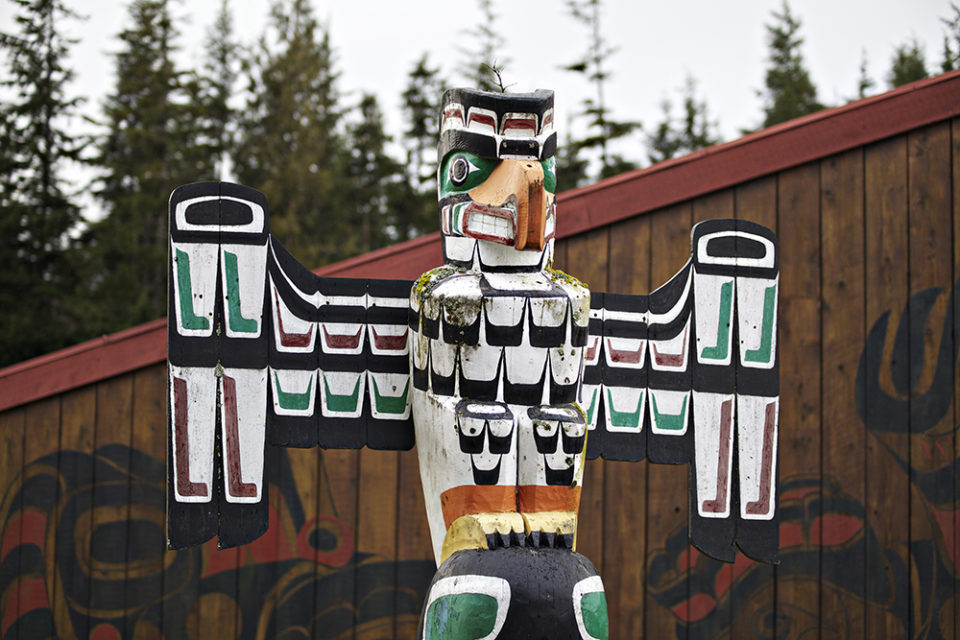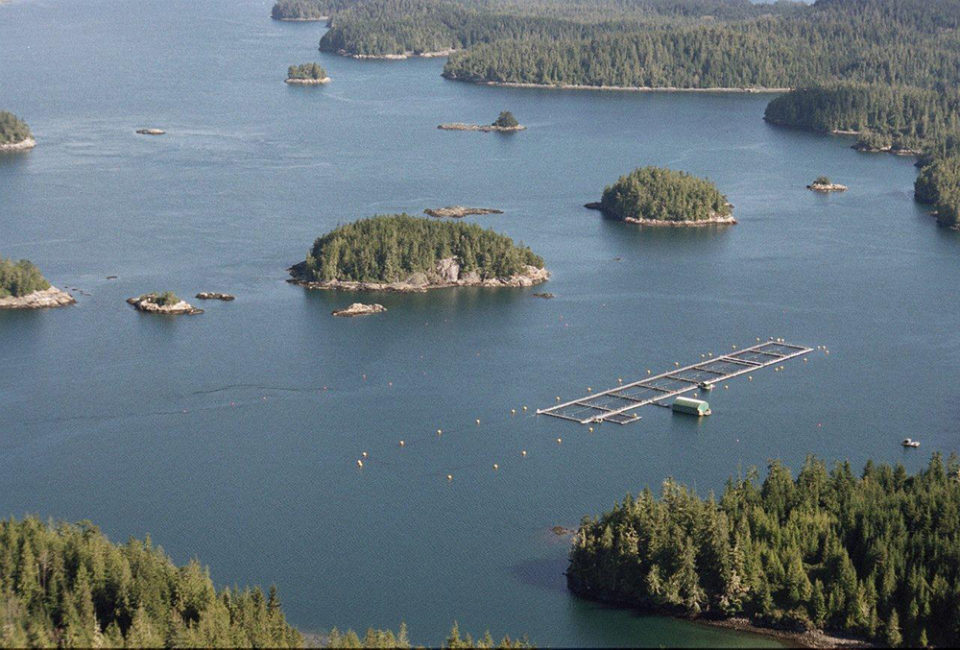New pact with First Nations aimed at protecting wild salmon runs through Broughton Archipelago

It’s taken a long time for aquaculture companies, First Nations representatives and the British Columbia Provincial Government to sit down at the same table, discuss their concerns and come up with solutions for the future of the region’s crucial waterways.
But on Dec. 14, after six months of meetings, an agreement was finally reached that 10 of the 17 ocean-based salmon farms in the Broughton Archipelago will close by the end of 2022. The closure of the farms will create a farm-free migration corridor for wild salmon on the northeast coast of Vancouver Island.
A First Nations-led monitoring program will supervise the closure of the farms, three of which will shutter immediately. The remaining seven will close over the next five years, unless the aquaculture companies operating them can reach an agreement with the Kwikwasut’inuxw Haxwa’mis, ‘Namgis and Mamalilikulla First Nations and maintain licenses from Fisheries and Oceans Canada.
“We are really thankful to the government for being willing to recognize our inherent rights to these waterways,” said Richard Sumner, elected chief councilor of the Mamalilikulla First Nations told the Advocate. “Our wild salmon stocks have been decimated and this is one of the first steps in rebuilding those stocks. To us, it’s all about the fish, the survival of our wild salmon. That’s the bottom line.”
Sumner said the previous administration of his community was in favor of aquaculture, while his administration, which took over two years ago, is not. There are a number of fish farms operating in his territory at present, among them “some critical ones for us to remove. We’re unanimously opposed to fish farming in our territory,” he said.
Still, he wasn’t ruling out the possibility of fish farms operating in Mamalilikulla waterways in the future, under certain conditions.
“If industry can prove to us that it doesn’t harm the environment or the wild salmon, we might be agreeable,” he conceded. “We will be monitoring and supervising, but we’re open to learning about new technologies that might sway our thinking, and to the possibility of companies proving to us that their work can be environmentally safe.”
Wild salmon is a keystone species for the First Nations, he said: “Our bears and other species that rely on the salmon are really suffering, and own food source for our people is affected, too. We’re the stewards of our land and I’m really hopeful for the future now. It may be hand in hand with the aquaculture industry, but only time will tell.”
Jeremy Dunn, director of community relations and public affairs at Marine Harvest Canada, said the new agreement is “a workable plan that respects First Nations concerns, but also respects our business and the people that work for us.”
“The First Nations say they never gave consent for salmon farms in their territory in the first place, and as a business, we hear those concerns,” he said. “In conjunction with the First Nations, provincial and federal governments we’ll be developing a monitoring and inspection plan through which the First Nations will have oversight of aquaculture operations in their territories. We believe this will go a long way toward building trust for our operations in the Broughton Archipelago.”
That trust does not exist right now, he added.

While Marine Harvest is confident in the health of its fish and the sustainability of its operations, there’s a profound need to generate the same confidence from others – not just First Nations, but concerned stakeholders throughout the province.
There’s been considerable conflict in this area for many years, with protestors and occupations on farms, Dunn said.
“First Nations partnership and cooperation isn’t new to Marine Harvest – we have 13 agreements with 25 different First Nations in whose territory we operate, some over 20 years old. But we needed the provincial government to get all of us around a table, listening to each other. And by listening we were able to find a workable plan going forward.”
The agreement with the Kwikwasut’inuxw Haxwa’mis, ‘Namgis and Mamalilikulla First Nations involves specific aquaculture tenures whose term had expired. But on June 20 the provincial government announced that any salmon farm tenure in the province expiring after June 2022 will need an agreement with First Nations in order to be renewed.
“These relationships with First Nations are incredibly important to our business, and we work every day to ensure we have the trust of those communities where our operations are situated,” Dunn said. “As a business we seek to engage with First Nations, partner with First Nations and seek their consent to operate in their territories. And going forward, this will be how Marine Harvest conducts business in British Columbia.”
Cermaq was also present at the negotiating table and offered to close its Burdwood and Cliff Bay farms as part of the plan.
“We wanted to acknowledge the concerns of the First Nations and to show that we are here to listen, learn and act in goodwill,” said David Kiemele, managing director. Cermaq has 28 farm licenses in Canada and the closure of the two farms represents 7 percent of its marine space. The company will shift employees to other farm sites and does not anticipate any losses of jobs or production as a result of the closures. Its remaining farms in the region will operate as normal with the understanding that beyond 2023, Cermaq will need agreements in place with the local First Nations.
“The Broughton Letter of Understanding recognizes Rights Holder and the needs of wild salmon, and is designed to create trust, goodwill, understanding and a path forward that balances the needs of the province, First Nations and aquaculture while still protecting iconic wild salmon and traditional First Nations rights and beliefs,” Kiemele said.
Cermaq began testing a semi-closed containment fishing system in Norway in early 2018. The system hopes to resolve concerns about sea lice infestations of migrating juvenile salmon, and it’s showing promising results, he added.
“The net is fully enclosed by a polymer fabric which prevents tidewater from entering the farm, and it greatly reduces interactions between wild and farmed salmon,” he said. Testing of this system in BC will begin in 2020 and 2021.
Follow the Advocate on Twitter @GAA_Advocate
Now that you've finished reading the article ...
… we hope you’ll consider supporting our mission to document the evolution of the global aquaculture industry and share our vast network of contributors’ expansive knowledge every week.
By becoming a Global Seafood Alliance member, you’re ensuring that all of the pre-competitive work we do through member benefits, resources and events can continue. Individual membership costs just $50 a year. GSA individual and corporate members receive complimentary access to a series of GOAL virtual events beginning in April. Join now.
Not a GSA member? Join us.
Author
-

Lauren Kramer
Lauren Kramer is a freelance journalist residing in Richmond, B.C., who has written extensively about seafood marketing for SeaFood Business magazine and SeafoodSource.com. Her work appears in a number of publications, including the National Culinary Review and Flavor & The Menu.
Related Posts

Innovation & Investment
Aquaculture in Canada: status, perspectives
Canada exports farmed seafood products to more than 22 countries and is the main seafood supplier to the U.S. market. Finfish, primarily salmon, production is strong and shellfish production is growing, but diversification will be imperative to maintain competitiveness.

Intelligence
Aquaculture’s solid opportunity on The Rock
As aquaculture grows in Newfoundland, the socioeconomic future of this Canadian province with a population of 500,000 takes flight with it. It's a welcome development, after a two-decade slump due in part to the downturn of North Atlantic groundfish stocks.

Intelligence
Canadian salmon farmers: ‘Leave us out of your shutdown’
The potential of a salmon-farming ban in Washington state is being monitored closely next door, in British Columbia, where many more salmon farms operate. But they’re not worried about a spillover effect.

Responsibility
In Canada, salmon farmers building social license with First Nations
After some rocky times, ties between B.C. salmon farmers and First Nations, have improved in recent years. Band members report consistent employment, royalties and improved quality of life. “We need aquaculture around,” says one fishing company owner.

